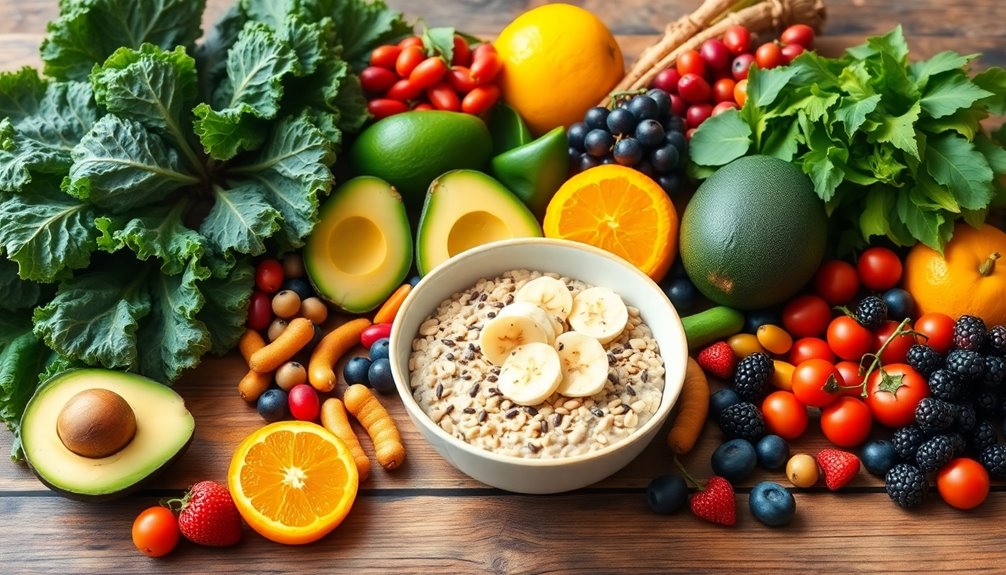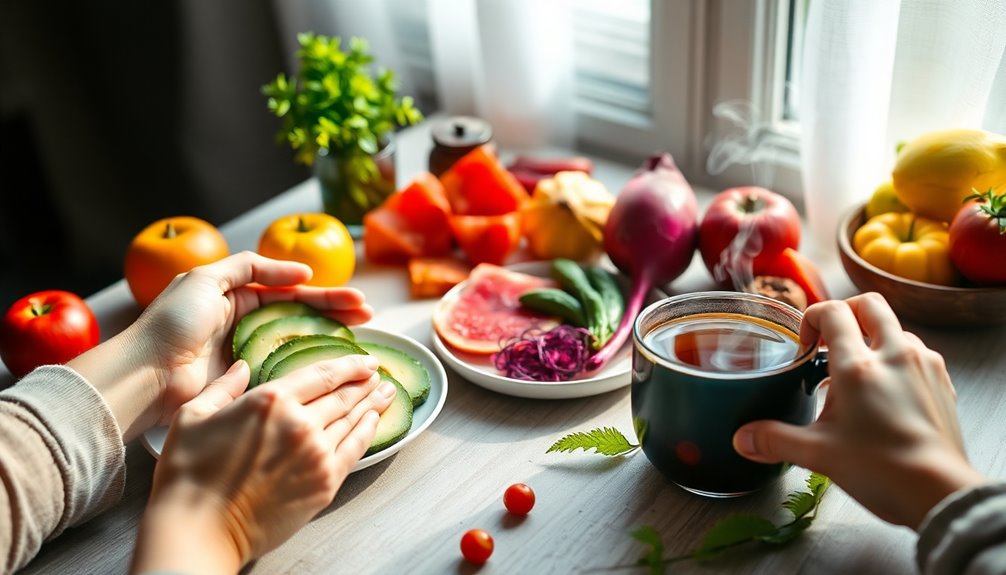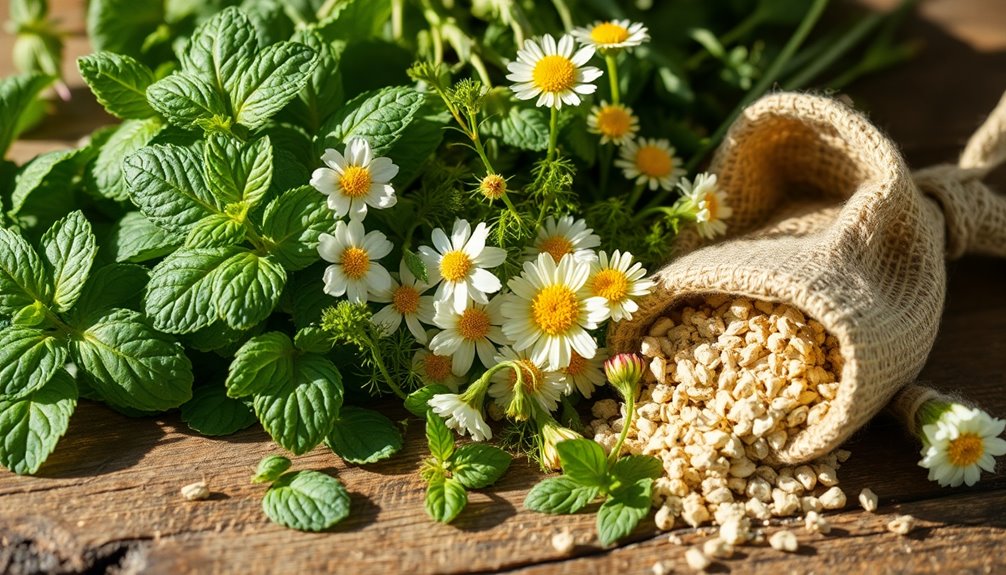You can improve your digestion naturally by following a few simple tips. First, stay hydrated to help break down food and prevent constipation. Eating more fiber from fruits, veggies, and whole grains aids bowel health. Incorporate probiotics by enjoying fermented foods like yogurt. Practice mindful eating to enhance digestion and reduce stress. Include digestive herbs, such as ginger and peppermint, for relief from discomfort. Make sure to engage in regular physical activity, like walking or yoga, to promote gut health. To wrap up, managing stress through relaxation techniques can support your digestive well-being. There's more to discover if you're curious about enhancing your gut health!
Key Takeaways
- Stay hydrated by drinking plenty of water to aid in breaking down food and preventing constipation.
- Incorporate high-fiber foods like fruits, vegetables, and whole grains for healthy bowel movements and better digestion.
- Add fermented foods such as yogurt and kimchi to your diet to promote gut health and improve nutrient absorption.
- Practice mindful eating by chewing food thoroughly and eating smaller, frequent meals to enhance digestion and reduce stress.
- Engage in regular physical activity like walking or yoga to improve digestion and support nutrient absorption.
Stay Hydrated

Staying hydrated is vital for maintaining a healthy digestive system. Your water intake plays a pivotal role in breaking down food, allowing nutrients to be absorbed efficiently. When you drink enough water, it helps to soften stool and prevent constipation, making those trips to the bathroom much more comfortable.
This isn't just about drinking eight glasses a day; it's about listening to your body and adjusting your hydration based on your activity level and environment.
The hydration benefits extend beyond just digestion. Proper hydration can enhance your energy levels, improve your mood, and even support your skin's health. When you're well-hydrated, your body operates more effectively, which includes processing food and eliminating waste. This means you'll likely feel lighter and more energized, allowing you to engage in activities that foster connections with others. Additionally, studies from the Garvan Institute of Medical Research emphasize the importance of hydration in overall health.
It's easy to forget to drink enough water, especially with busy schedules. Keep a water bottle handy, or set reminders on your phone to help you stay on track. You can also incorporate foods with high water content, like fruits and vegetables, into your diet. Not only will this boost your water intake, but it also adds essential nutrients that support overall wellness.
Incorporating hydration into your daily routine is a simple yet effective way to nurture your digestive health and feel your best. So, grab that water bottle and make hydration a priority; your digestive system will thank you!
Eat More Fiber

A diet rich in fiber is vital for optimal digestion and overall gut health. Fiber plays an important role in keeping your digestive system running smoothly. When you include more fiber sources in your meals, like fruits, vegetables, whole grains, and legumes, you're not just adding bulk to your diet; you're also promoting healthy bowel movements and preventing constipation.
The benefits of fiber extend beyond just digestion. It can help you feel fuller for longer, making it easier to manage your weight. Additionally, fiber supports the growth of beneficial gut bacteria, which can improve your immune function and reduce inflammation. This means that when you choose high-fiber foods, you're investing in your overall health.
You might wonder how to up your fiber intake. Start by incorporating more fruits like apples and bananas, or add a side of veggies to your meals. Whole grain bread and pasta are excellent fiber sources, too. Beans and lentils aren't only filling but also packed with fiber, making them great additions to soups and salads.
As you gradually increase your fiber intake, remember to drink plenty of water. This helps the fiber do its job effectively and keeps your digestive system balanced. By embracing these fiber-rich choices, you'll not only support your digestion but also feel more connected to a community that values health and wellness. Incorporating mini band workouts into your routine can further enhance your digestive health by stimulating metabolism and promoting overall fitness.
Incorporate Probiotics

Incorporating probiotics into your diet can greatly enhance your digestive health. Probiotics are live microorganisms that provide numerous benefits when consumed in adequate amounts. They help promote gut health by balancing bacteria in your digestive system. A healthy balance of good bacteria can prevent issues like bloating, constipation, and diarrhea, creating a smoother digestion experience.
You can find probiotics in various fermented foods, such as yogurt, kefir, sauerkraut, and kimchi. These foods aren't only delicious but also packed with nutrients that support your overall well-being. If you're not a fan of these foods, you might consider taking probiotic supplements, which are widely available and can be tailored to your specific needs.
Research shows that incorporating probiotics can enhance the diversity of gut bacteria, leading to improved digestion and better nutrient absorption. This is especially important for individuals with digestive disorders or those recovering from antibiotic use, as antibiotics can disrupt the natural balance of gut flora. Additionally, maintaining a healthy gut is essential for overall liver health, as an unhealthy liver can impact digestion and nutrient metabolism, leading to serious health complications.
When you commit to including probiotics in your diet, you're taking an essential step toward fostering a healthier gut environment. You're not alone in this journey; many people are finding the benefits of probiotics and experiencing noticeable improvements in their digestion. Remember, a balanced gut is key to feeling your best, so why not give probiotics a try? Your digestive system will thank you.
Practice Mindful Eating

Practicing mindful eating can greatly improve your digestion and overall well-being. When you focus on your food, you're more likely to enjoy each bite and notice how your body responds. This approach encourages mindful chewing and slow eating, which can enhance your digestive process. By taking your time, you allow your body to signal when it's full, reducing the chances of overeating.
Here's a quick guide to help you incorporate mindful eating into your daily routine:
| Mindful Eating Tips | Benefits |
|---|---|
| Chew each bite slowly | Improves digestion |
| Eliminate distractions | Enhances food enjoyment |
| Pay attention to flavor | Encourages satisfaction |
| Set a pleasant atmosphere | Reduces stress while eating |
By adopting these practices, you'll find that your meals become more satisfying. Mindful chewing allows your saliva to break down food more effectively while also activating digestive enzymes. This can help prevent discomfort and bloating after meals. Slow eating gives your stomach time to communicate with your brain, helping you recognize when you're full.
Moreover, creating a calm environment for your meals can foster a deeper connection with your food and those you share it with. As you make these changes, you'll likely experience not just improved digestion but also a greater appreciation for the nourishment you provide your body. Embrace mindful eating, and watch how it transforms your relationship with food! Furthermore, incorporating mindfulness meditation into your routine can enhance your ability to focus during meals, promoting a more enjoyable eating experience.
Include Digestive Herbs

Including digestive herbs in your diet can greatly improve your digestive health. These herbal remedies have been used for centuries to promote gut health, and they can be a powerful addition to your daily routine. Incorporating herbs like ginger, peppermint, and fennel can relieve common digestive issues such as bloating, gas, and indigestion.
Ginger is well-known for its effectiveness in soothing upset stomachs and reducing nausea. Studies suggest that it can stimulate saliva and bile production, enhancing digestion.
On the other hand, peppermint is excellent for relaxing the muscles in your gastrointestinal tract, which can help alleviate discomfort and improve overall digestion.
To cap it off, fennel seeds are renowned for their carminative properties, helping to reduce gas and bloating while promoting smooth digestion.
Incorporating these herbs can also support emotional healing and improved sleep quality, which are essential for overall wellness and digestion.
Here are some ways to include these herbs in your diet:
- Ginger tea: Brew fresh ginger slices in hot water for a soothing drink after meals.
- Peppermint oil: Add a few drops to your water or choose peppermint tea for digestive relief.
- Fennel seed snack: Chew on fennel seeds after meals to freshen your breath and aid digestion.
Regular Physical Activity

Engaging in regular physical activity is one of the most essential ways to enhance your digestion. When you move your body, you stimulate the muscles in your digestive tract, helping food move through more smoothly. This can lead to improved nutrient absorption and may even boost the production of digestive enzymes, which are vital for breaking down food effectively.
Incorporating activities like walking, cycling, or swimming into your daily routine can make a significant difference. Even simple exercises can help. You might consider adding yoga poses, such as the seated forward bend or the supine twist, into your practice. These poses not only promote flexibility but also gently massage your internal organs, encouraging better digestion.
Moreover, regular physical activity fosters a sense of community. Whether you're joining a local yoga class or participating in a group run, you're engaging with others who share your interests. This social aspect can further motivate you to stay active, as you'll feel a sense of belonging and accountability. Additionally, incorporating core strengthening exercises can further enhance your overall physical activity and support your digestive health.
Ultimately, by prioritizing regular physical activity, you're not just benefiting your digestive health but also enhancing your overall well-being. So, put on those sneakers, roll out your yoga mat, and embrace the movement. You'll find that your body—and your digestion—will thank you for it.
Manage Stress Levels

Managing stress levels plays a crucial role in maintaining healthy digestion. When you experience stress, your body enters fight-or-flight mode, which can disrupt your digestive processes. By finding effective ways to handle stress, you can greatly enhance your digestive health and overall well-being.
Incorporating practices like meditation techniques and breathing exercises into your daily routine can help soothe your mind and body. Here are some practical strategies to enhance:
- Allocate time for mindfulness: Dedicate a few minutes each day to practice mindfulness meditation. This can boost your awareness and help you connect with your body, ultimately supporting better digestion.
- Practice deep breathing: Try simple breathing exercises, like taking deep breaths for a count of four, holding for four, and exhaling for another four. This can decrease your heart rate and promote a relaxed state conducive to digestion.
- Discover your relaxation regimen: Choose an activity that brings you joy—whether it's yoga, reading, or immersing yourself in nature. Engaging in these calming activities can help reduce stress and cultivate a more favorable environment for digestion. Additionally, managing stress through mind/body techniques has been shown to reduce blood pressure, which can further enhance overall health.
Frequently Asked Questions
How Long Does It Take to See Improvements in Digestion?
When you start making changes to your digestion, you might notice improvements within a few days to a couple of weeks. Incorporating regular exercise can enhance digestion by boosting your metabolism.
Managing stress effectively can help your gut function better. Both these factors play crucial roles in how quickly you feel a positive difference.
Are There Specific Foods to Avoid for Better Digestion?
Imagine your digestive system as a delicate orchestra; certain foods can throw it off-key. To keep it harmonious, avoid common dietary triggers like spicy dishes, dairy, and high-fat meals.
Meal timing also plays an essential role; eating large meals late at night can create discord. By being mindful of what you consume and when, you'll help your body perform at its best, creating a symphony of smooth digestion.
Can Supplements Replace Natural Digestive Improvements?
Supplements can't fully replace natural improvements for your digestion. While probiotics offer benefits and digestive enzymes can help, they're most effective when combined with a balanced diet rich in fiber.
Focusing on whole foods enhances gut health and provides essential nutrients that supplements alone might lack.
How Does Sleep Quality Affect Digestion?
Imagine drifting into a peaceful sleep, your body rejuvenating, your mind unwinding. When you maintain healthy sleep patterns, your gut health flourishes, promoting better digestion. Quality sleep aids in stress management, reducing cortisol levels that can disrupt digestion.
Conversely, poor sleep can lead to digestive issues, creating a cycle that's hard to break. Prioritizing good sleep not only enhances your overall well-being but also supports your digestive system, allowing you to thrive.
Are There Age-Related Digestive Concerns to Consider?
As you age, you may notice changes in your digestion. Aging often leads to a decline in digestive enzymes, making it harder for your body to break down food. You might also experience a decrease in beneficial gut bacteria.
To address these issues, consider lifestyle changes like incorporating probiotics into your diet and eating smaller, more frequent meals. Staying active can further support your digestive health and help you feel your best as you age.
Conclusion
By embracing these seven natural methods, you can transform your digestive health into a flourishing garden. Picture vibrant fruits and vegetables thriving in rich, fertile soil, nourished by hydration and mindful eating. As you introduce probiotics and digestive herbs, imagine your gut as a lively ecosystem, teeming with beneficial bacteria. Regular exercise and stress management are the sunlight and rain that help this garden grow. With these practices, you're not just improving digestion; you're cultivating overall well-being.



